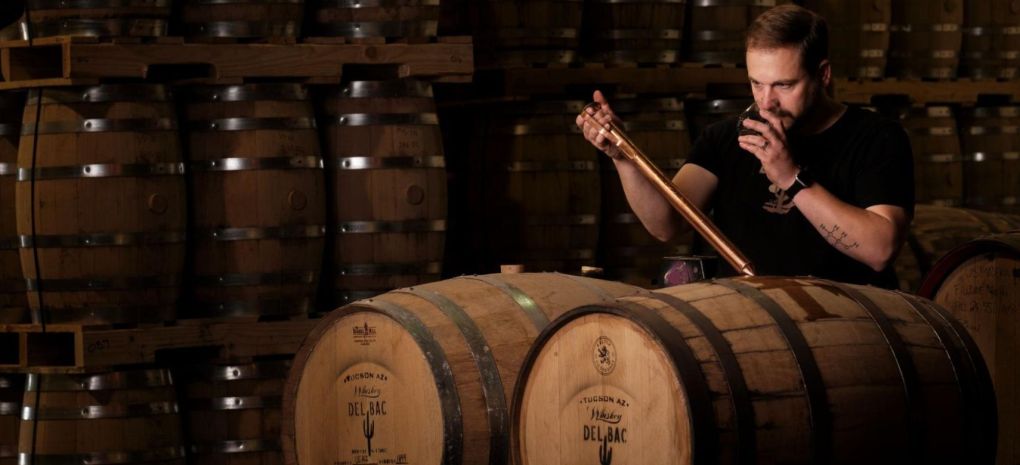
05/04/2023 My typical day begins between 6 and 6:30 each morning. This gives me a chance to run checks on all of the equipment and do any walkthroughs of long-running projects before our production staff arrives.
Tell us a little about your background and journey into distilling
Like a lot of other craft distillers, I essentially fell into the business. My wife and I are huge foodies – we’ve always loved to cook, and we’ve always loved to mix cocktails. After I left journalism to begin working in public relations and marketing, I kept freelance writing – specifically covering craft spirits and the burgeoning cocktail renaissance that was beginning to make its way from the coasts into middle America.
My wife and I had the opportunity to establish a beverage program at a local theater company where we were living at the time and spent the decade slowly introducing more and more craft spirits and craft cocktails into our community.
After several years of writing about spirits and cocktails while managing the theater bar program, three area farmers got together and founded Boot Hill Distillery – a craft distillery in Dodge City, Kansas focused on using grain grown on their farms to produce what we called “soil to sip” spirits. I saw what I felt was a huge opportunity and walked away from my public relations job to learn how to become a distiller. After all - what better way to expand my love of crafting amazing drinks than to be able to make the spirit itself?
That was seven years ago, and there's still nothing else I'd rather be doing.
Your current role and what does your day look like?
As head distiller at Whiskey Del Bac, my typical day begins between 6 and 6:30 each morning. This gives me a chance to run checks on all of the equipment and do any walkthroughs of long-running projects before our production staff arrives. I'll make a pot of coffee for the team, hash out the production schedule for the day, and get all of the day-to-day distillation operations started so everything can be humming by the time the crew arrives.
I call it my church time - A bit of meditation to focus exclusively on the whiskey before the sound and fury of production begins.
Our production team arrives at 7 a.m. to take over the usual production for the day. I count myself lucky to have one of (if not the) best production teams in the business.
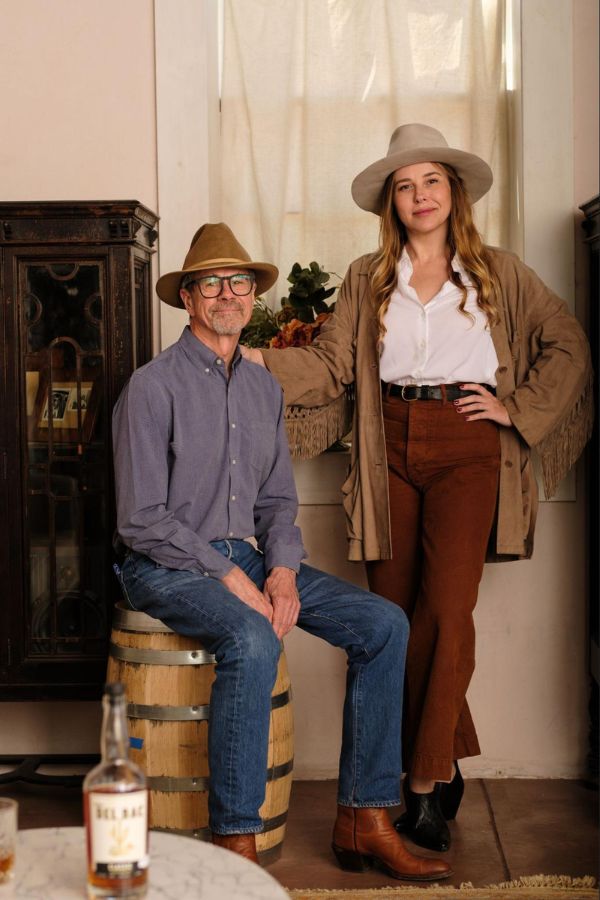
Our Lead Distiller Dustin Cox and Distiller Abbey Fife handle most of the day-to-day production responsibilities for the rest of the day. I chip in and help out whenever I can/whenever they need an extra set of hands.
The majority of my day is spent on things like paperwork and reporting, check-ins with our department heads here at Whiskey Del Bac, long-term planning meetings, virtual meetings with the various boards that I sit on, final approval of finished products, etc.
For me it's the best of both worlds: I still get to have my hands directly involved in production so I intimately know what's going on in the still room, and can help address any challenges or changes facing the production team.
What inspired you to become a distiller?
Honestly, it just sounded like a cool gig.
I feel a bit awkward that my reasoning for becoming a distiller is so simple and doesn't come from something as romantic as lifelong passion or an inherited title passed down across centuries. As I mentioned earlier, I wasn't getting a lot of job satisfaction out of my public relations work. I was passionate about craft spirits and craft cocktails, and educating people that there were so many drinks beyond the traditional Jack and Cokes that people were slinging down every weekend.
I was lucky enough to have fallen into the position. I was even lucky to discover that it was what I wanted to do for the rest of my life. The marriage of science and art, consistency and variations. It still honors me to know that there are people who reach for a bottle that I had a hand in making to celebrate, or even for their regular nightcap.
What are some of the most important skills for a distiller?
Willingness to Fail - The head of operations at the first distillery where I cut my teeth would often say "Distilling is 75% science and 25% magic." What he meant was - Taking risks and making mistakes is how you build an amazing product and an amazing brand. But only if you're taking the time to track WHY things failed, and then pivot from there.
Keep Your Ego in Check - There's always someone out there more talented than you. More driven than you. More successful than you. I've been in the spirits industry for more than a decade - distilling for almost half of that. Every time I feel I have an "expert" grasp on something, I either meet someone with exponentially more knowledge than me. Or I spectacularly screw something up. Be confident in your abilities and know when to stand your ground. But don't ever think you know everything. That's how you stagnate as a distiller and never grow past where you are now. The day you wake up and say "I think everything is perfect" is the day to retire.
It's All About Community - This ties in with what I said above. You can have the world's best palate. You can craft the most insane spirits anyone has ever tasted. No one wants to purchase your product because you're a jerk? You're in trouble. It's rote to say it but it's true - A high tide raises all ships. That doesn't mean going out and sharing your secret recipes with everyone. It just means we were all beginners once. Be calm, be understanding, and share your knowledge. When we're all better, we're ALL better.
How do you think a distiller can help in driving marketing and sales personally?
There's an encouraging trend of people recognizing the hard work, talent, and skill of people who create things with their hands. This has led to an increasing desire by consumers to want to "meet" those that make their products. By being able to share their knowledge and passion with the community that consumes their products, I think that distillers and blenders are in a unique position to help underline the authenticity of the distillery where they ply their trade. It's also an amazing opportunity to put hard workers in the spotlight.
Define a good distiller
Being a "good" distiller in the traditional sense is important. You know being thoughtful about your production processes and creating delicious juice is key to having a product people want. But a "good" distiller? A good distiller benefits the community as a whole. See my answers above - Being a good distiller involves being humble, thoughtful, and driven. But not at the expense or detriment of those around us.
What is the hardest part of a distiller's job?
Consistency. We're doing our best to wrangle a relatively wild natural process. Effective distilling processes help minimize the changes and anomalies that happen. But, no matter how large or small your distilling operation is, you're going to have outliers.
There are tons of challenges that face distillers - Balancing cost-to-yield. Ensuring high-quality products. Establishing and encouraging a culture of safety. Being responsible with production, and waste management.
What's your elevator pitch to a bartender when pitching your brand
Whiskey Del Bac is a love letter to the Sonoran Desert and the American Southwest. Some bristle at the idea of terroir existing within distilled spirits - and it can be argued that "terroir" in its traditional sense doesn't exist because distilled spirits are somewhat commodified.
However, Whiskey Del Bac leans into the challenges and opportunities presented by the Sonoran Desert. Aggressive aging, utilizing mesquite instead of peat.
Whiskey Del Bac is a whiskey from and OF the southwest, and there's no other American Single Malt like it.
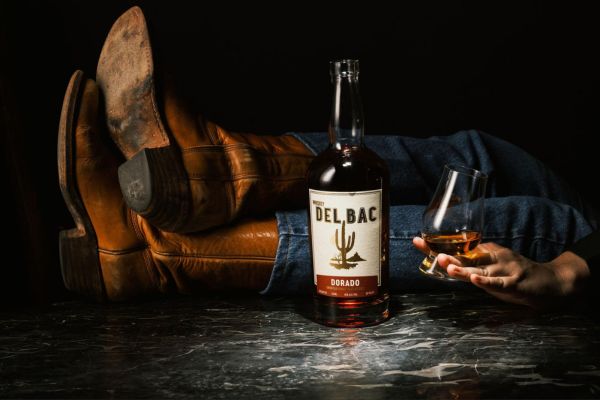
What are the current challenges the spirits industry is facing according to you?
The industry faces a litany of challenges right now. Spirits producers - and craft spirits producers in particular - are still reeling from the lingering effects of the pandemic. Inflation is cutting into already small profit margins, forcing many to reassess how they can keep their doors open. Decreasing spending in response to financial troubles means a lot of smaller producers are getting traded out with larger spirit brands.
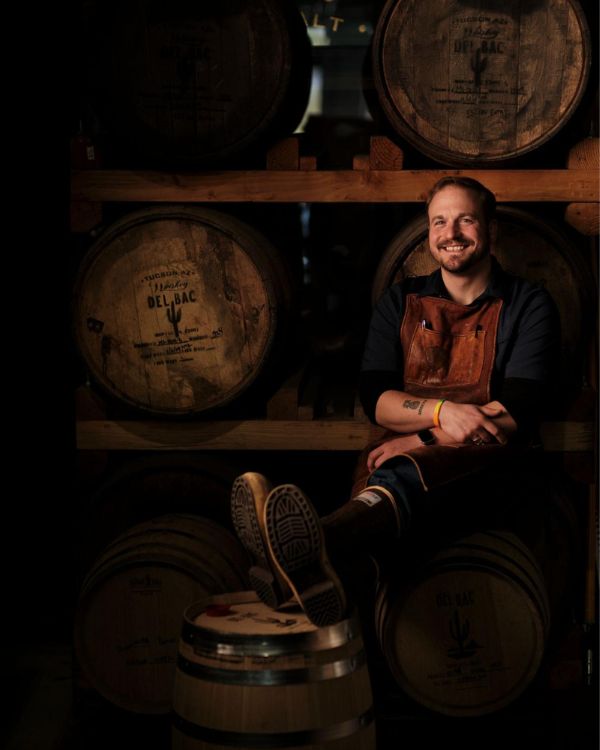
It's one of the reasons that parity with Direct Consumers is so important for the livelihood of small producers. A thoughtful, legal, and responsible way to get alcohol directly to consumers has already been tested and proven effective through the direct-to-consumer wine market.
By working towards parity with spirits, we can offer a necessary lifeline to the small spirits producers that may struggle through more traditional distribution methods.
It's one of the reasons that direct-to-consumer shipping is one of the top priorities for the preponderance of the craft spirits industry.
What skill or topic you are learning currently and why?
I'm a firm believer that as distillers we should be simultaneously expanding our knowledge while reviewing subjects wherein we feel we already have a good grasp.
Every year I like to revisit the book Proof: The Science of Booze by Adam Rogers. It's a wonderful pop-science book that gives the basics of fermentation, the history of booze, and a nice peak behind the curtains on a wide breadth of knowledge.
In terms of new subjects, I'm the process of digging deep into water quality and water science, especially as it impacts the health of fermentations, flavor profiles in distilled spirits, and flaws that can be introduced if you're not careful.
It's easy to forget about water in the day-to-day, but in American Single Malt Whiskey there are four ingredients - water, malt, yeast, and barrel. If one of those things goes wrong, it all goes wrong.
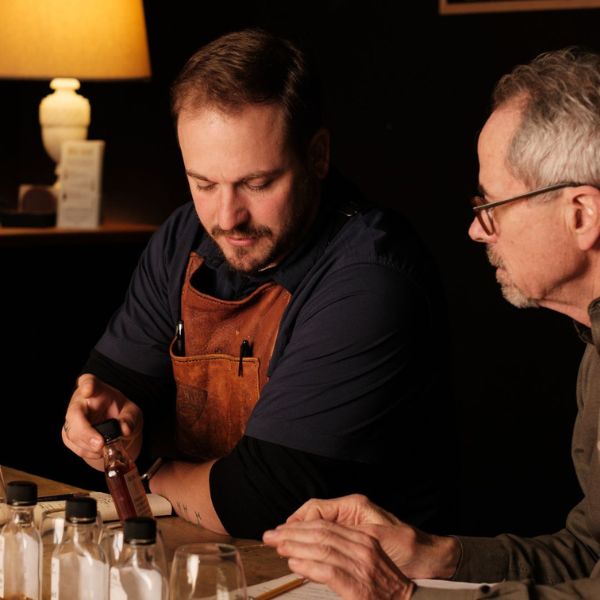
What is your idea of a good life?
I think at the end of the day - If I was able to have at least a small net positive impact on the people who have come into my orbit, then I've lived a good life. Not at the sacrifice of my happiness or the happiness of my loved ones. But within a healthy and mature context.
I think, bare minimum, that's our job on this earth - To leave it slightly better than how we found it, right? To not cause undue harm and hurt.
Do I fail at that? Constantly. But I hope each time I try a little bit harder to be a little bit better.
Accolades are wonderful. It's a huge honor to be able to help make a product that's so widely enjoyed. And one of the beautiful things about well-crafted spirits is we can use them to celebrate the good times.
But all that is simply in passing if we're not working to make things just a little bit better.
[[relatedPurchasesItems-31]]
Which is your go-to drink and what is the perfect setting you enjoy it in?
Ooooh, it's time for one of those obnoxious "it depends" answers!
OLD FASHIONED
Especially with our Dorado. Other whiskies and brandies and aged spirits are just as good. It should have five ingredients - Base Spirit, Sweetener, Bitters, Ice, and Citrus Peel Twist. This drink evolves as the ice melts, creating three different experiences. Base spirit dominant up front, smooth sipper in the middle, dessert at the end.
NEGRONI
A poorly picked gin can wreck a good Negroni. Some gins swing sweet, some piney. Knowing the right gin to mix with the right sweet vermouth is a practice in artistry. Built with ice and a twist of orange peel over the top.
SAZERAC
Spicy rye whiskey. Citrus bite. Earthiness herbal licorice from the absinthe. It's so complex but so brilliant.
And the best way to enjoy them? With loved ones, all together.
Your favourite 2-3 distilling or spirits books?
The three I'll suggest are all very "all booze" focused. Countless books dig down into specific spirits like whisk(e)y, rum, gin, absinthe, vermouth, etc. that I could recommend. But these three are three highly recommend if you're wanting a wide spread of knowledge on distilled spirits.
1) Proof: The Science of Booze by Adam Rogers
An excellent pop-sci overview of spirits, how they're made, and the history that's developed around fermented and distilled beverages.
2) Distilled: A Natural History of Spirits by Rob DeSalle and Ian Tattersall
In a similar vein to Proof, Distilled approaches the history and production of spirits from the viewpoint of evolution, ecology, history, primatology, molecular biology, physiology, neurobiology, chemistry, etc.
3) The Alcohol Textbook: A Reference for the Beverage, Fuel and Industrial Alcohol Industries by D. R. Kelsall, Kathryn Ann Jacques, and T. P. Lyons
This is the textbook on ethanol production. Sometimes massively dense and hard to penetrate, because... Well, it's an actual textbook. But even being able to utilize this for quick reference on production methods, etc. is invaluable.



